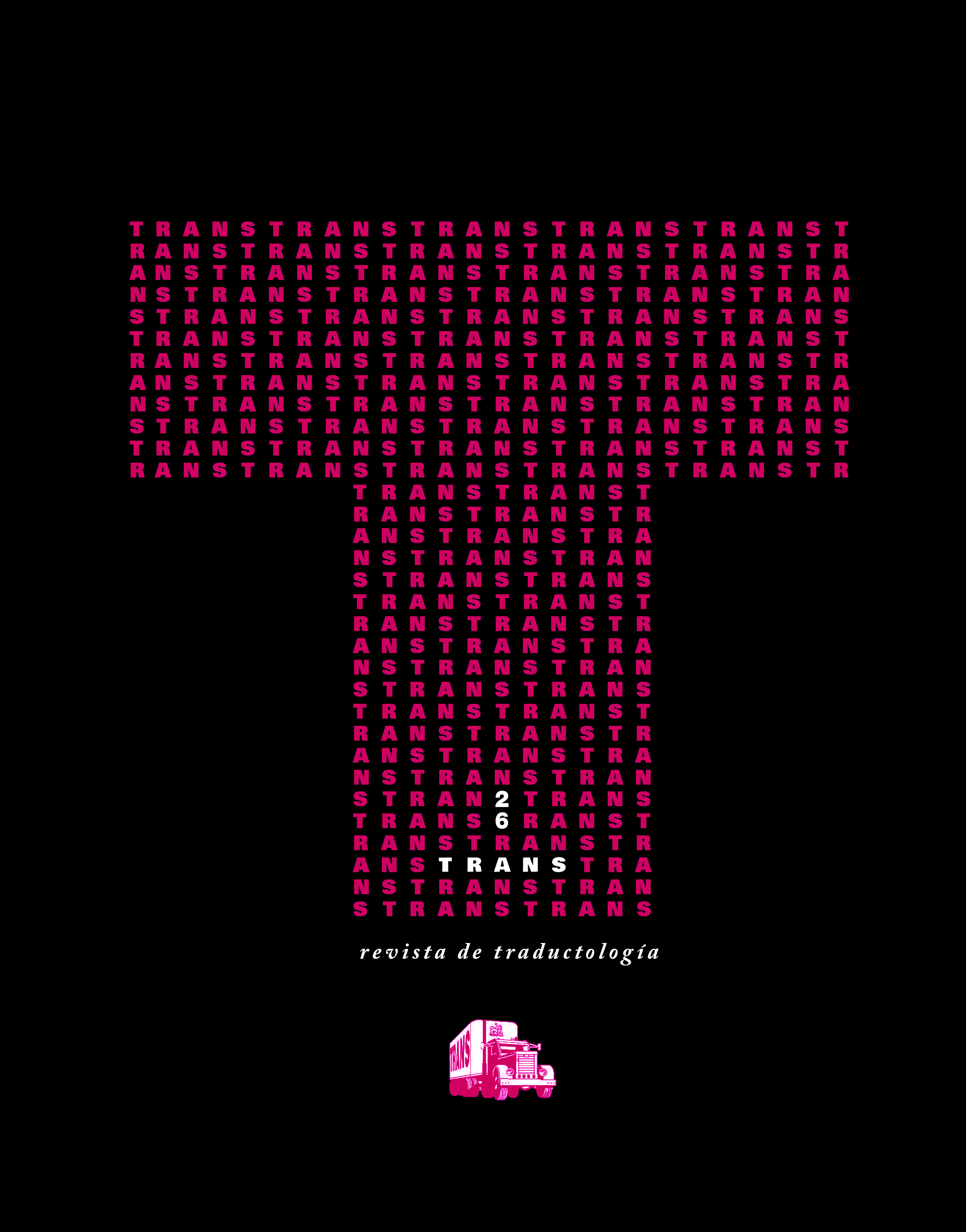Translation: That obscure object of (re)search. A quarter century of progress in translation studies
DOI:
https://doi.org/10.24310/TRANS.2022.v26i1.5242Keywords:
translation-related research, (in)visibility, methodology, interdisciplinarityAbstract
The commemoration of the 25th anniversary of the journal Trans. Revista de traductología provides a unique opportunity to take stock of the evolution in research in the field of translation studies over this period. Drawing on illustrative examples, this contribution discusses important transformations in the object of study of translation-related research, as well as its increasing commitment to interdisciplinarity and to the fine-tuning of its methodological approaches. These emerge as ways forward for addressing a ubiquitous and elusive phenomenon which is conceived as occurring at numerous intersections among heterogeneous cultures, languages and identities coexisting and colliding within spaces-in-translation, especially in the global and digital age.
Downloads
Metrics
Publication Facts
Reviewer profiles N/A
Author statements
Indexed in
-
—
- Academic society
- N/A
- Publisher
- Universidad de Málaga
References
Bachmann-Medick, D. (2009). Introduction: The translational turn. Translation Studies, 2(1), 2-16. https://doi.org/10.1080/14781700802496118
Bassnett, S. (1998). The translation turn in cultural studies. En S. Bassnett y A. Lefevere (Eds.). Constructing cultures: Essays on literary translation (pp. 123-140). Multilingual Matters.
Bassnett, S., y Johnston, D. (2019). The outward turn in Translation Studies. The Translator, 25(3), 181-188. https://doi.org/10.1080/13556509.2019.1701228
Bielsa, E. (2005). Globalisation as translation: an approximation to the key but invisible role of translation in globalisation. Working papers (University of Warwick. Centre for the Study of Globalisation and Regionalisation), 163. http://wrap.warwick.ac.uk/1956/
Bielsa, E. (2018). Identity. En O. Carbonell y S. A. Harding (Eds.). The Routledge handbook of translation and culture (pp. 48-60). Routledge.
Bielsa, E., y Kapsaskis, D. (Eds.) (2021). The Routledge handbook of translation and globalization. Routledge.
CBS13/AP (2015). “I did kill those cops,” suspect says during hearing for deputy killings. CBS News. https://www.cbsnews.com/sacramento/news/i-did-kill-those-cops-suspect-says-during-trial-for-deputy-killings/
Cronin, M. (2012). Translation in the digital age. Routledge.
Cronin, M. (2013). Translation and globalization. En C. Millán y F. Bartrina (Eds.). The Routledge handbook of Translation Studies (pp. 491–502). Routledge.
Chesterman, A., y Arroyo, R. (2000). Shared ground in Translation Studies. Target, 12(1), 151-160.
Gentzler, E. (2017). Translation and rewriting in the age of post-translation studies. Routledge.
Hernández Guerrero, M. J. (2009). Traducción y periodismo. Peter Lang.
Hernández Guerrero, M. J. (2019). La traducción en las nuevas formas de periodismo. MonTI (número especial), 5, 72–93. https://doi.org/10.6035/MonTI.2019.ne5.3
López Guix, J. G. (2015). De espejos y máscaras. Una propuesta para la traducción de los lenguajes “rotos”. Trans: Revista de traductología, 19, 265–276. https://doi.org/10.24310/TRANS.2015.v2i19.2079
López Guix, J. G., y Minett Wilkinson, J. (1997). Manual de traducción. Inglés-Castellano. Gedisa.
Martín Ruano, M. R. (2022). De evoluciones y retos en la investigación traductológica del siglo xxi. TRANS: Revista de traductología, 26, 179-199.
Meylaerts, R. (2011). Translational justice in a multilingual world: An overview of translational regimes. Meta, 56(4), 743–757. https://doi.org/10.7202/1011250ar
Morillas, E., y Arias, J. P. (Eds.) (1997). El papel del traductor. Almar.
Neubert, A., y Shreve, G.M. (1994). “A house of many rooms”: The range of Translation Studies. En D. Kadish y F. Massardier-Kenney (Eds.). Translating slavery: Gender and race in French women’s writing 1783–1823 (pp. vii-xiv). Kent State University Press.
Peña, S. (10 de junio de 2005). En pocas palabras (VI). El trujamán. https://cvc.cervantes.es/trujaman/anteriores/junio_05/10062005.htm
Rodríguez Espinosa, M., y Martín Ruano, M. R. (2019). Traducción, conflicto, violencia simbólica. Trans: Revista de traductología, 23, 11-18. https://doi.org/10.24310/TRANS.2019.v0i23.6695
San Ginés Aguilar, P., y Ortega Arjonilla, E. (Eds.) (1997a). Introducción a la traducción jurídica y jurada (inglés-español). Comares.
San Ginés Aguilar, P., y Ortega Arjonilla, E. (Eds.) (1997b). Introducción a la traducción jurídica y jurada (francés-español). Comares.
Snell-Hornby, M. (1988). Translation Studies: An integrated approach. John Benjamins.
Steiner, G. (1998). Errata. El examen de una vida. Trad. Catalina Martínez Muñoz. Siruela.
Venuti, L. (1995). The Translator’s invisibility: A history of translation. Routledge.
Venuti, L. (1998). The Scandals of translation: Towards an ethics of difference. Routledge.
Ximénez de Sandoval, P. (5 de febrero de 2015). Sí, yo maté a esos polis. Ejecutadme. El País. https://elpais.com/internacional/2015/02/05/actualidad/1423093992_873618.html
Zaro, J.J. y M. Truman. 1999. Manual de traducción/A manual of translation. SGEL.
Downloads
Published
How to Cite
Issue
Section
License
All contents published in TRANS. Revista de Traductología are protected under the Creative Commons Attribution-NonCommercial-ShareAlike 4.0 International (CC BY-NC-SA 4.0) license. All about this license is available in the following link: <http://creativecommons.org/licenses/by-nc-sa/4.0>
Users can copy, use, redistribute, share and exhibit publicly as long as:
- The original source and authorship of the material are cited (Journal, Publisher and URL of the work).
- It is not used for comercial purposes.
- The existence of the license and its especifications are mentioned.
- ShareAlike — If you remix, transform, or build upon the material, you must distribute your contributions under the same license as the original.
There are two sets of authors’ rights: moral and property rights. Moral rights are perpetual prerogatives, unrenounceable, not-transferable, unalienable, imprescriptible and inembargable. According to authors’ rights legislation, TRANS. Revista de Traductología recognizes and respects authors moral rights, as well as the ownership of property rights, which will be transferred to University of Malaga in open access.
The property rights are referred to the benefits that are gained by the use or the dissemination of works. TRANS. Revista de Traductología is published in an open access form and it is exclusively licenced by any means for doing or authorising distribution, dissemination, reproduction, , adaptation, translation or arrangement of works.
Authors are responsable for obtaining the necessary permission to use copyrighted images.













21.png)
